#prison in russia
Explore tagged Tumblr posts
Text
Vladimir Kara-Murza in interview with Meduza after release from prison:
I knew new even before my arrest that, according to international law , prolonged solitary confinement is equivalent to torture, cruel and inhuman treatment. Moreover, prolonged confinement is considered to be 15 days in a row. I sat in solitary confinement for almost 11 months non-stop. I admit honestly, before prison, before I went through this experience myself, I could not understand: what is torture in this? On the contrary, I thought, you sit alone, no one bothers you, you write what you want, read books - it is certainly better than sitting with criminals in a barracks. Only a person who does not know what prison is could think so. It is truly torture. When people talk about torture, many people imagine needles being shoved under their nails or being hit with an electric shock device. But moral and psychological torture can be stronger than physical torture. And I can say that complete isolation from any human communication is absolutely unbearable. Man, as Aristotle said, is a social creature. We need communication with each other just like food, drink, air. When you are completely cut off from this, then very quickly - I will say frankly - you start to go crazy. You lose concentration, your thoughts start to get confused, some kind of nonsense comes to mind.
I had a big plus when I was sitting in the special regime colony #7, in the EPKT. There was a bridge for the guards next to the bars, and cats would come there - I would talk to them. I'm just a big cat lover, so I felt very warm inside (we have two Bengal cats at home, I haven't seen them for two and a half years. I'll see them soon !). The cats were my only interlocutors in that prison.
A special anti-psychotherapeutic measure for prisoners - at any presentation, any written statement, you must indicate your term. The date April 21, 2047 will be with me forever, do you understand? In the sixth colony, some of the bosses still liked to come up and ask: "How much time do you have left, Vladimir Vladimirovich? 22 or 23 years, remind me?"
Often people who have not been through prison imagine prison guards as some kind of cartoonish villains from movies. But the vast majority of people in the prison system are quite normal. And this is also terrible, because evil in our world is done by the hands of such ordinary people who carry out orders and, as they say, "nothing personal."
Within the Russian penitentiary system, the city of Omsk is a household word. It has the most monstrous, the most hellish regime. I didn’t know that. I remember when I was being transported from Moscow to Siberia last year, first they put me in a sorting cell with other prisoners. We managed to chat for half an hour. And when the guard came and said: “Kara-Murza, Omsk,” everyone around suddenly fell silent and began to look at me with some kind of sympathy. I only understood what was going on when I got there. I would describe the regime in Omsk as something between a concentration camp and a madhouse. It is a regime taken to the point of absurdity, absolutely hypertrophied. Everything is down to the last decimal point, down to the second, down to the last point. You have to keep your hands behind your back, even if you take two steps. A step to the right, a step to the left – no. An extra movement – no. Constant searches, constant performances – it is very important to keep your emotions under control in prison, but, I admit, it is not always possible when you exist in this. Constant video surveillance. For example, a long documentary could be made about my stay in the EPKT in the seventh colony in Omsk. True, it would be very boring, because nothing happened there, I was just sitting in a solitary confinement cell. But it would be very long - in addition to the fact that two cameras were constantly working in the cell itself, all the employees also had video recorders turned on. Literally every minute was recorded. And you also need to psychologically disconnect from the fact that you are constantly under surveillance. By the way, you can disconnect from this, because it is impossible to live like that. And of all this, the most terrible, even by Omsk standards, was the prison hospital, where I was sent last. I knew from literature that the camp hospital was perceived by prisoners as a rest. But I was not in the camp hospital itself, I was in a prison inside the hospital - there is also a PKT block for especially dangerous prisoners. The same solitary confinement cell, the same bunk attached to the wall from reveille to lights out. In the entire block, two cells were occupied - mine and another one. And this prison hospital is a separate little circle of hell. - What makes it the most terrible place? — I don’t even know if it’s possible to describe it in words. The same thing was happening in the hospital, only on a completely exaggerated scale. There were constant searches at every step, literally every 50 meters. Hands behind your back. Face to the wall. You can’t look at anyone. Plus, as a bonus, there are all sorts of medical procedures, not the most pleasant ones - like gastroscopy, when they stick a tube into your stomach. I can't stand that since childhood. They did it to me again.
In prison, you lost 25 kilograms. In "The Steep Route," Evgenia Ginzburg, repressed in 1937, тold how after several years in prison, she looked in the mirror and recognized herself only by her resemblance to her mother. How did you perceive your reflection? .. To be honest, I didn’t notice it visually. But I noticed that it became painful to lie down because my bones were sticking out. And it was painful to sit for the same reason. And then I asked to be taken to the medical unit and have my weight measured. Speaking of historical parallels, I then remembered that Aleksandr Isayevich Solzhenitsyn wrote in “The Gulag Archipelago” that he always found it funny to think about Soviet party functionaries who went to elite sanatoriums to lose one and a half to two kilograms. He wrote: “I recommend the Soviet Gulag. A couple of months, and you will get rid of the problem of excess weight completely.” I can confirm this from my own experience.
When did you realize that you were in for an exchange and not death? — At the very last moment, when they took me to the FSB bus in the Lefortovo yard. It all started last Tuesday, July 23 — it was the longest week of my life, as if a year had passed. Suddenly the doors to my cell opened (I, as an especially dangerous person, had two doors: an outer one, closed with several locks, and an inner one with bars). Two uniformed operatives entered and took me to the service office of the PKT building. On the wall was a large portrait of Putin, on the table lay a blank sheet of paper, a pen and a sample. They said: “Vladimir Vladimirovich, sit down and write.” I looked — and it was a petition for pardon addressed to citizen Putin: “I fully admit my guilt, I repent of my actions,” and so on. At first I thought they were playing a joke on me, and I laughed. But these people turned out to have no sense of humor. I said that I was not going to write anything. The operative asked why. I explained: “First, I do not consider citizen Putin a legitimate president, I consider him a usurper, a dictator, and a murderer. And second, I am not guilty of anything. I am here solely for my views, for my convictions, for my statements against the war.” They asked me five more times, and then took me back to the cell. Two days later, on Thursday, July 25, the operatives come in again. They take me to the same office, but there is another piece of paper there. The operative says to me: "Vladimir Vladimirovich, you allowed yourself to make a statement about our president, Vladimir Vladimirovich Putin. The conversation was recorded on a video recorder, transcribed in text form, and placed on the desk of the head of the institution, who demands that you write a written explanation." On this piece of paper I wrote everything I think - that I do not consider Putin a legitimate president, but consider him a usurper, that he bears personal responsibility for the death of Boris Nemtsov , for the death of Alexei Navalny and for the death of thousands of peaceful citizens of Ukraine, including children. And that I do not intend to admit any guilt, because the criminals are those who unleashed this aggressive war. I didn't understand what was happening at all. On the night from Saturday to Sunday, from July 27 to 28, at three o'clock, the doors opened with a bang, operatives and a convoy burst in, some in uniform, some in civilian clothes, which I saw for the first time. The prison warden was standing nearby. "You have five minutes, get dressed, you are leaving us today." I was absolutely sure that they were taking me away to be shot, I asked: "What, in the nearest forest when trying to escape, as is customary with you?" They didn't answer.
They take me out into the courtyard, where a silver bus with tinted windows is parked. The luggage compartment is open, they tell me to throw my things in, and then they lead me into the bus. I see that it is filled with the same people in black balaclavas - and with each of them there are people I know very well. The first one I saw was my friend and colleague Andrei Pivovarov. The second was Oleg Petrovich Orlov from Memorial. And the third was Ilya Yashin, who said the phrase I already mentioned. And at that moment I understood everything! Were you able to talk to each other? — It was hard on the bus, but on the plane it became easier to breathe. Unfortunately, we have such a domestic tradition: foreigners get the best, and our own people get only the last bit. Even here they followed this: we sat in economy class, and the foreigners (Evan Gershkovich, Paul Whelan, Alsu Kurmasheva and Patrick Schebel) were taken to business class. We flew for three to three and a half hours. When we landed, we saw several more planes and two buses from the windows. The FSB officers began to take us out one by one, also by the shoulder. I was the last one left in the cabin. My FSB officer looked at me and said: "Vladimir Vladimirovich, be careful eating there, or you know how it happens." These were the last words I heard from our escorts.
We get off the plane [in Ankara] and go to a bus with tinted windows — about the same as in Moscow. Our FSB guys are there, again hiding their faces behind balaclavas. And two representatives of the German government get on the bus. They have printouts with our photos, biographies, interviews in their hands. They approach each one and check whether it is really us, whether they have been planted with some doubles. It was quite difficult with me: I lost 25 kilograms during my arrest and I am very different from the photos they had. So at first they were very suspicious and started asking questions. But I passed the exam on the details of my biography.
As soon as they boarded the plane, the doors of our bus closed and we were taken to some building, apparently for receptions. There, an aide to the German Chancellor welcomed us back to freedom and told us that we would then be taken on two planes to Cologne/Bonn Airport, where Chancellor Olaf Scholz would meet us. At that moment – and you remember, I was in absolute surrealism – a woman came up to me with a phone in her hands and said that she was a representative of the American embassy and that [American] President Biden would be speaking to me. At that moment, I realized that it was time for me to stop trying to understand anything. I hope that some of what I said was understandable. I have forgotten how to speak Russian - only "Hello" to the guards. And I have not used English at all for two and a half years. My wife and children were in the Oval Office, I heard their voices. It is impossible to describe in words, so I will not even try.
2 notes
·
View notes
Text
Russia just freed SIXTEEN political prisoners in a prisoner swap with the West!
Among the released political prisoners are:
Oleg Orlov, a longtime dissident and the co-chair of Memorial, an organization created in 1989 to chronicle the USSR's human rights abuses and educate Russians about the history of political repression;
Sasha Skochilenko, an LGBTQ artist who was imprisoned in April 2022 for replacing price tags at grocery stores with data about Russian destruction in Ukraine, deemed treasonous under Russia's "fake news" law;
Vladimir Kara-Murza, a political dissident who was fundamental in bringing about the Magnitsky Act to sanction Russian human rights abusers, and who was poisoned twice by the KGB in attempted assassinations before being sentenced to 25 years in prison for "treason";
Evan Gershkovich, a young American journalist who was arrested in Russia while reporting for the Wall Streeet Journal in March 2023 and sentenced to 16 years in prison for "espionage";
Paul Whelan, American former Marine who was arrested in 2018 and sentenced to 16 years of hard labor for "espionage";
Alsu Kurmasheva, a Russian-American journalist with Radio Free Europe/Radio Liberty who was sentenced to 6.5 years in prison for spreading "fake news" about the war in Ukraine;
Andrei Pivovarov, an opposition activist who headed the pro-democracy organization Open Russia before being imprisoned in a Siberian penal colony infamous for its torture of prisoners;
Ilya Yashin, a young opposition politician who was sentenced to 8.5 years in prison for publishing YouTube videos about the war in Ukraine; when Russian authorities "encouraged" him to leave the country, he chose instead to stay;
Lilia Chanysheva, opposition activist and regional coordinator of Navalny HQ; in her final speech before the Russian court, she tried in vain to appeal to the judge's sense of empathy: "If you put me in jail for 12 years, I will be too old to bear a child. Give me a chance to be a mother!";
Kevin Lik, a dual German-Russian citizen who was arrested as a minor for "photographing military sites" shortly before the 2022 invasion of Ukraine; he was the youngest person ever to be convicted of treason in Russia;
Rico Krieger, a German man sentenced to death in Belarus for supposedly planting explosives on a railroad track to help the Ukrainian army;
Dieter Voronin, a dual German-Russian citizen and political scientist who was arrested in 2021 in connection to a treason case involving Russian journalist Ivan Safronov;
Patrick Schobel, a German man arrested in February 2024 at the Pulkovo International Airport in St Petersburg when customs officers found cannabis gummies in his luggage, in a scenario very similar to that of Brittney Griner;
German Moyzhes, a dual German-Russian citizen and lawyer who was charged with treason for helping Russians obtain European residency permits;
Vadim Ostanin, opposition activist and Navalny associate arrested in 2021 for his work with Navalny's Anti-Corruption Foundation;
Ksenia Fadeyeva, dissident and Navalny associate sentenced to 9 years in prison.
#russia#россия#prisoner swap#evan gershkovich#paul whelan#vladimir kara murza#sasha skochilenko#alexei navalny#oleg orlov#ilya yashin#dissident#dissidents#саша скочиленко#владимир кара мурза#илья яшин#андрей пивоваров#andrei pivovarov#алексей навальный
180 notes
·
View notes
Text

russian captivity for Americans vs russian captivity for Ukrainians
#war crimes#russia#ukraine#current events#prisoner exchange#russian invasion of ukraine#genocide#russia is a terrorist state#human rights#russian invasion#war in europe#war in ukraine
185 notes
·
View notes
Text
“I tried to explain that I was a musician but it didn’t work. You say you are a musician and it irritates them so much they beat you more, and accuse you of lying,” said Merkotan
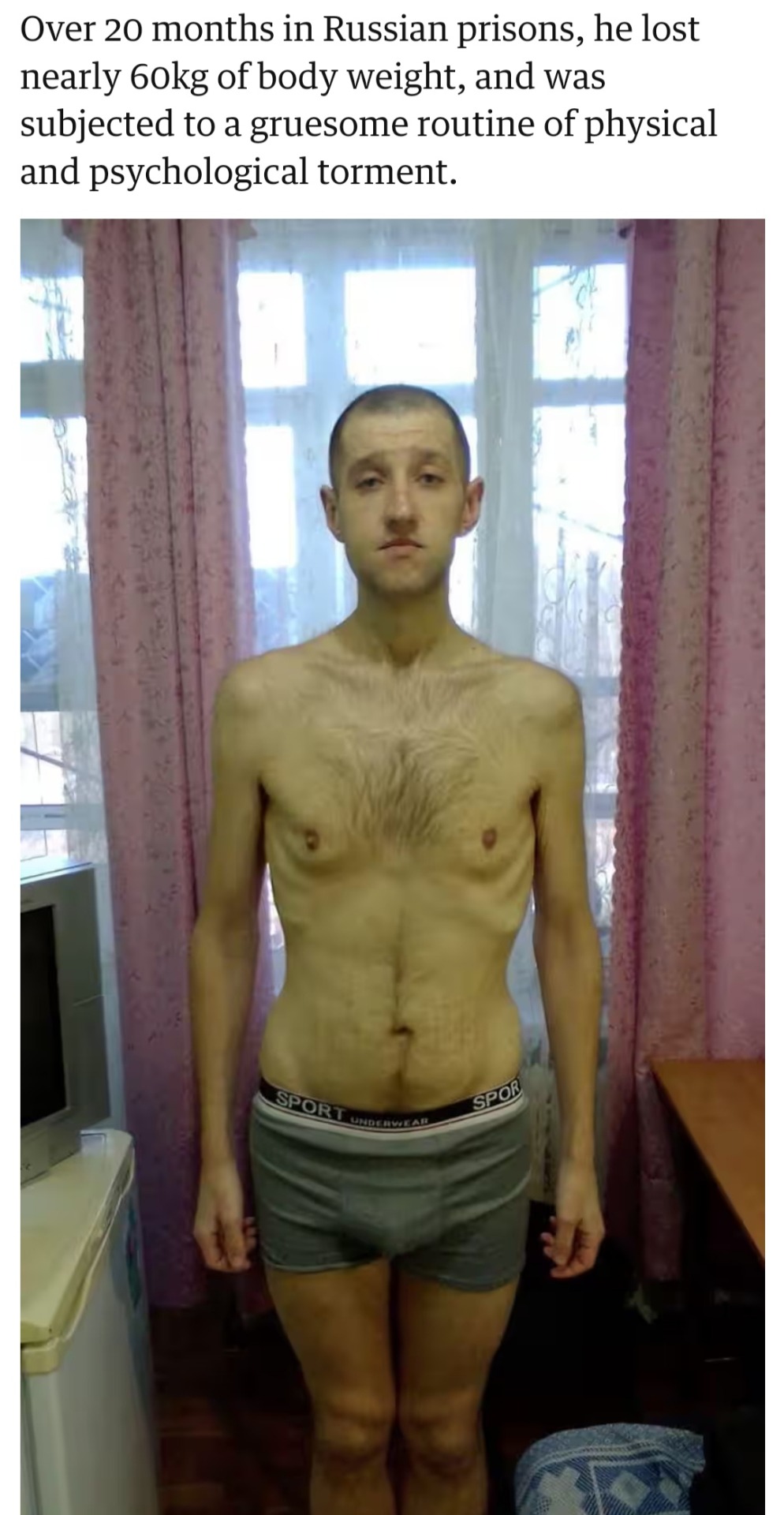
While international organizations inspect and have access to our prisons where Russian prisoners are held, they turn a blind eye and do not fight for proper conditions for Ukrainian prisoners.
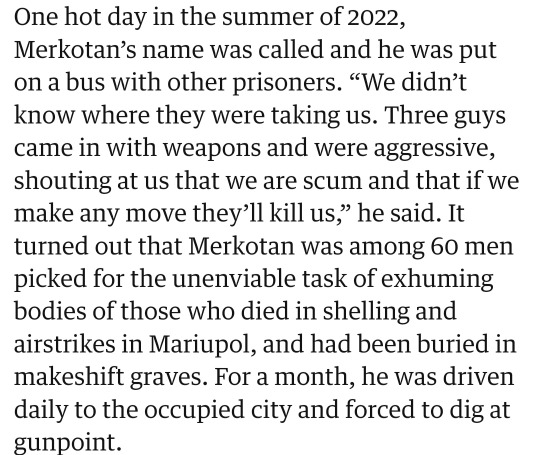
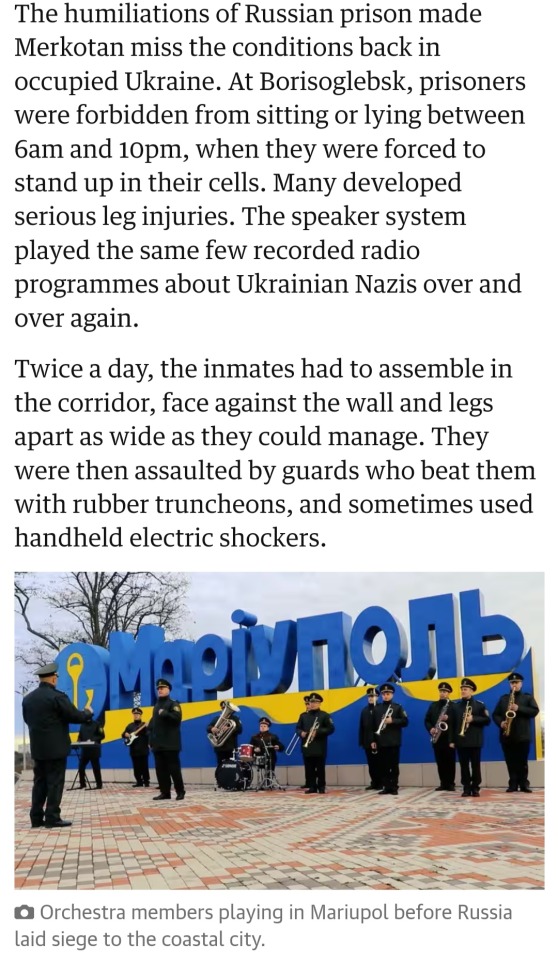
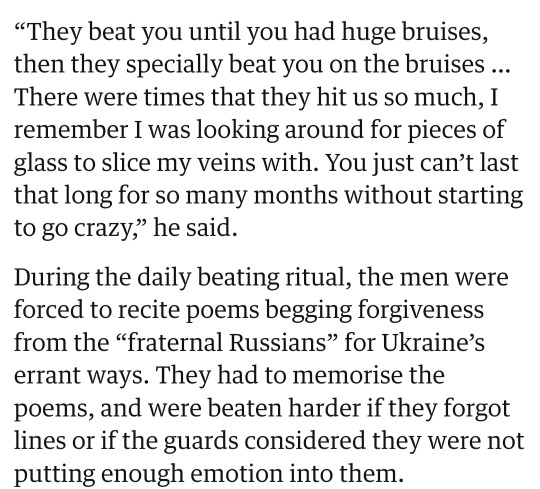
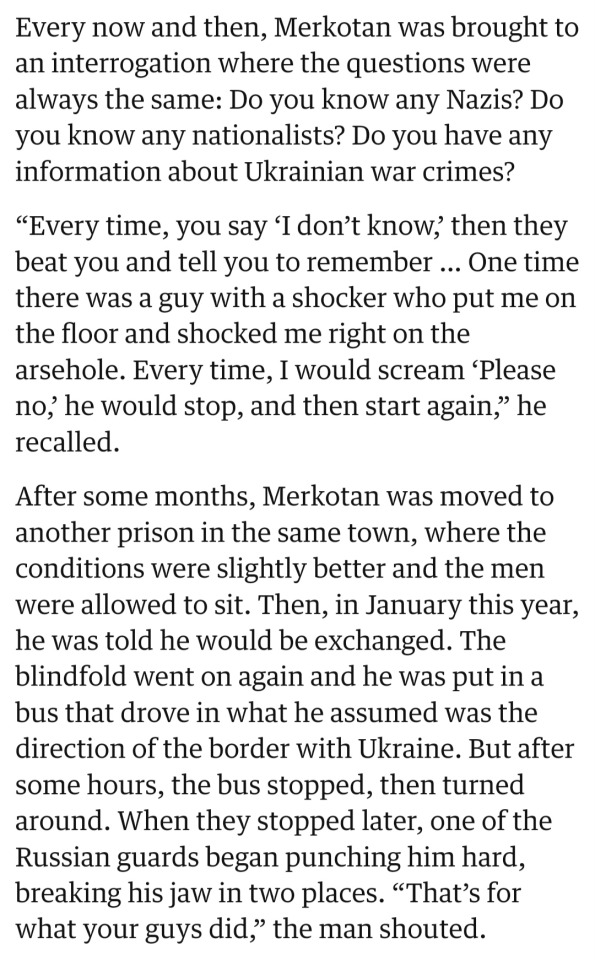
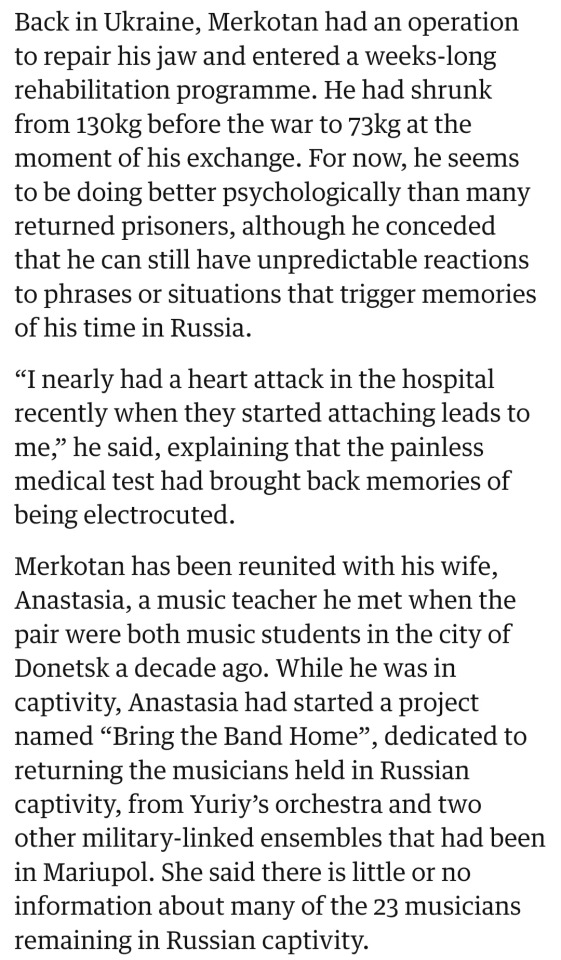
Another thing that outrages me is the way "Putin's prison" is used. It was not Putin who tortured him and others, but russians. This is not Putin's war, but Russia's. These are not the decisions and crimes of one person. After 10 years of war, the Russians are still being singled out and absolved of responsibility. That's impossible levels of stupidity and cowardice.
#ukraine#musician#music#culture#russia is a terrorist state#russo ukrainian war#russian invasion of ukraine#prisoner of war#war in ukraine#russian war crimes#war crimes#genocide#stop the genocide#free azovstal defenders#free defenders#world#united states#stand with ukraine#standwithukraine#arm ukraine#український tumblr#український тамблер#news#captivity#important#signal boost#please reblog#colonial violence#russia must burn#it's russia's putin
180 notes
·
View notes
Text
112 notes
·
View notes
Text

"Among those being freed are the American journalist Evan Gershkovich, who was detained in Russia last year and accused of espionage, and Paul Whelan, a former Marine who has been in Russian captivity since 2018."
source 1
source 2
source 3
#destiel meme news#destiel meme#news#united states#us news#world news#us politics#world politics#russia#russian news#russian politics#global politics#political prisoners#paul whelan#evan gershkovich#prisoner swap#russia news#biden administration
138 notes
·
View notes
Text



These terrible photos show a Ukrainian, Roman Gorylyk, after two years in russian captivity.
Roman and 74 other prisoners were returned from russian torture chambers on 31.05.2024 as part of a prisoner of war exchange, although he did not take part in hostilities.
Roman is a senior checkpoint controller at the Chornobyl nuclear power plant. He and the other 168 National Guardsmen who guarded the Chornobyl nuclear power plant were literally taken hostage by the russians and taken from Ukraine through Belarus in March 2022.
89 of them are still being held captive, and the russian side is using them to exchange them for russian soldiers captured in battle.
#war in ukraine#russia is a terrorist state#stand with ukraine#russia#russian aggression#наша русофобія недостатня#war prisoner exchange#mine#нема слів окрім...#випалити.........
98 notes
·
View notes
Text
Yesterday, after two years in russian captivity, my sister-in-law's friend returned home.
His relatives didn't recognize him. Shaved head, morbidly thin, quiet, and with an empty stare - he looked nothing like himself. His mother, though, who kept fighting for her son and for his brothers-in-arms, who organized rallies to remind everyone about the prisoners of war and conditions in the russian prisons - she recognized him. I saw the video of their first meeting, how she hugged him and told him everything would be fine now.
The worst part? He didn't recognize her.
#some days i think i can't hate russians more#and then this happens#personal#prisoners of war#russian war crimes#russian war in ukraine#russia is a terrorist state#russia must burn
62 notes
·
View notes
Text
By Cheryl LaBash
The U.S. government is attempting to criminalize international solidarity but has come up against a solid and growing wall of support for the Uhuru 3 when their federal trial opened Sept. 3 here in Tampa.
Collectively known as the Uhuru 3 — Omali Yeshitela, Chairman of the African People’s Socialist Party, Penny Hess, Chair of the African People’s Solidarity Committee, and Jesse Nevel, Chair of the Uhuru Solidarity Movement — are falsely accused of being pawns of a foreign government. And, of course, that foreign government would need to be Russia to justify spending so much on the investigation and what, at the outset, looked like a lengthy trial.
The proverbial election interference elephant in the room is undoubtedly AIPAC and “Israel” that get a free pass. Not to mention the holier-than-thou U.S. government interventions on every continent, “color” revolutions like the one preceding the war in Ukraine.
What an indictment of the U.S. government that it would even suggest that an African freedom organization with a 50-year history would need a foreign power to instruct them to fight for reparations.
#Uhuru 3#political prisoners#solidarity#Black liberation#Russia#color revolutions#imperialism#racism#Ukraine#Omali Yeshitela#APSP#Struggle La Lucha
78 notes
·
View notes
Text
INKTOBER
Day 13: Horizon. Borodianka.

Day 14: Roam.

#ukraine#russia is a terrorist state#russian aggression#russia#russian invasion#fuck russia#genocide#russian imperialism#artwork#artists#artists on tumblr#artist#russian war crimes#war crimes#genocide of ukrainians#укртамблер#український тамблер#український tumblr#укртумба#укртумбочка#украрт#арткозацтво#арт#малювання#inktober#october#war#prisoner of war#ukrainians#art challenge
45 notes
·
View notes
Text

(c) @ natashale777
In May 2022, in Yevpatoria, a 27-year-old artist doused the "city administration" with blue and yellow paints as a sign of protest against the actions of the Russian Federation on the territory of Ukraine. In addition to using paint, Ziza threw a bottle with an incendiary mixture into the building. In June 2023, a Russian court sentenced the artist from Yevpatoria to 15 years in a general regime colony. Human rights defenders recognized the case of Bohdan Ziza as politically motivated, and the Crimean himself as a political prisoner.
#ukraine#украина#україна#russia#россия#росія#putin#путин#путін#война#war#art#illustration#crimea#political prisoners#ілюстрація#иллюстрация#арт#крим#крым
37 notes
·
View notes
Text
"Ukrainians who stayed on to work at the plant say they did so under duress. Employees report that Russian occupiers coerced them into adopting Russian citizenship and signing contracts with Rosatom. According to a recent IAEA report, the plant has announced that workers still officially employed by Energoatom, Ukraine’s state nuclear company, are barred from the site. The workforce “now consists of former Energoatom employees who have adopted Russian citizenship and signed employment contracts with the Russian operating entity, as well as staff who have been sent to the ZNPP from the Russian Federation.”
On top of that, current and former employees of the ZNPP, some of whom escaped past enemy lines, have said that Russia brutalized the plant’s dwindling workforce, resorting to torture to keep workers in line.They also report that Russia is violating international law by using the plant as a military staging ground, further increasing the risks to the facility. This claim has been supported by satellite evidence.
From the start of the war, Energoatom has objected to the occupation of the ZNPP, and raised alarms about the dangers the plant faces. Recently, the IAEA has also issued warnings about the degrading state of the ZNPP and the continued potential for a meltdown. In February, it issued a bulletin warning that the plant’s last backup external power line had been disrupted, creating a “precarious” situation. Today, the IAEA’s director general, Rafael Mariano Grossi, met with President Vladimir Putin and Alexei Likhachev, the head of Rosatom, in a closed-door session to discuss his concerns about the plant. But the agency has thus far been ineffectual in compelling Russia to cooperate, and its authority does not extend to claims of human-rights abuses away from the plant, even when they involve employees.
The result is a crisis unprecedented in the history of nuclear power. A disaster at the facility would be most immediately harmful to the people living near it. But the ZNPP is located in the watershed of the Dnipro River, which flows through southern Ukraine and into the Black Sea. If a meltdown occurs at the ZNPP and affects the waterways, experts indicate that all of southern Ukraine might be at risk for contamination.
...
In their stories of working at the ZNPP after the Russian occupation began, several sources describe incidents of detentions, interrogations, and torture. Kostiantyn Chebaievskyi worked at the ZNPP until August 2022, when he says he was arrested at the end of his shift and imprisoned by Russians. Chebaievskyi says that he was accused of communicating with Ukrainian authorities and that interrogators beat him and tried to force him to make a false confession. Other people employed at the ZNPP at the time say that cells intended to hold four to six people were used to detain up to 20 prisoners without any food, save what their relatives were able to bring on visits.
Chebaievskyi says that one form of torture involved what his captors called “a phone call to Lenin.” According to Chebaievskyi, the men would clip one cable to his earlobe and another to his finger, and then interrogate him while they turned the crank on a modified field telephone that would deliver a shock. “Everything goes dark,” he said. “All that you see is white lighting.” Chebaievskyi said that the interrogators repeated the procedure over and over, demanding to know his supposed contact in Ukraine. He also reported that some prisoners were forced to give interviews for Russian television crews, reciting prewritten scripts that were complimentary toward Russia. Chebaievskyi was released after 18 days, and then managed to escape from the city.
Other ZNPP employees corroborate allegations of abuse and torture. Volodymyr Zhaivoronok is a 50-year-old former equipment operator who says he was imprisoned for 53 days, many of them in the same cell where Chebaievskyi ended up. Zhaivoronok says Russian personnel beat the prisoners, targeting their backs, necks, and shoulders. “One is bringing you into the room, and another six people come there,” Zhaivoronok told me and my colleagues at the Reckoning Project. “They come in with batons, pistols.” He recalled that the torture room was covered in blood, and prisoners were forced to clean it. Zhaivoronok said that during one of the sessions, his torturers shot him in the side with a rubber bullet.
...
ZNPP employees claimed in 2022 that their plant also became a shield [like Chernobyl]. They reported that they heard what they believed to be Russian mortar shells launched from within or near ZNPP territory, and also saw Russian military equipment in crucial locations of the plant, including turbine halls near reactors. This equipment included armored personnel carriers and trucks, tanks, anti-aircraft systems, and rocket launchers. These sources also stated that Russian soldiers—possibly hundreds of them—have been deployed to the plant, and have complete access to spaces designated for evacuation and sheltering. These claims were supported in a September 2023 report, commissioned by Greenpeace, that used satellite imagery to identify signs of military activity in the vicinity of the plant. An accident involving military equipment and ordnance could damage the systems needed to cool the reactors, and could lead to a leak of radioactive material.
The operation of Zaporizhzhia, like that of all nuclear-power plants, is subject to international law, and to regular inspections by the IAEA, a treaty organization that reports to the United Nations. Since the beginning of the occupation, the IAEA and its director general, Grossi, have made several visits to Ukraine and to the ZNPP in particular, and have offered ongoing assistance to the plant’s administrators. In May, Grossi told the UN Security Council that the situation at the ZNPP “continues to be extremely fragile and dangerous,” and noted that the plant did not have enough staff to maintain safety measures, even with the reactors shut down. Grossi added that there had been seven occasions since the occupation began when the plant lost off-site power and had to rely on diesel generators, “the last line of defence against a nuclear accident.” (The plant has since suffered another external power loss.) In that address, Grossi asked that Russia abide by certain principles in its operation of the plant, including refraining from using it for military weapon storage."
- Nataliya Gumenyuk, "Looming Disaster at the Zaporizhzhia Nuclear Power Plant," The Atlantic. March 6, 2024.
#zaporizhzhia nuclear power plant#nuclear power plant#zaporizhzhia#international atomic energy agency#russia-ukraine war 2022#russian invasion of ukraine#prisoners of war#torture#military occupation#energoatom#rosatom
46 notes
·
View notes
Text

The serial killer Chikatilo doing yoga before his execution 1993
46 notes
·
View notes
Text
Anyone who has seen how russia treats its prisoners isn't shocked at the treatment of the terror attack suspects. It's is a common pattern: torture someone then film their "confession". Similar things are done to Russian political prisoners, foreign nationals, Ukrainian prisoners of war, Ukrainian civilians..... with other variations, sometimes not filmed, sometimes even worse torture, sometimes sexual violence...
#russia#then there are those ppl who say why concerned about terrorists#um....#civilized country?#torture#how systematic it is#similar patterns#we know awful things r done to Ukrainians#without cameras#i cant imagine#smersh does a lot of confessions#and its done to ppl in prison#regular prisoners#film to blackmail them#rape them and film it and blackmail them and they do things for them so they dont get into lower prison caste...#i have been looking at these hr abuses#the worst of things#how ppl suffering#something must be done to stop horrors#theyre showing it before the world and does it care#nazi like#how it suppresses citizens like#if u feel like want to protest... and u know what goes on in those prisons...
71 notes
·
View notes
Text

Chances are, if you’re reading this, you’re someone with a lot of voting power.
#activism#vote vote vote#go vote#your vote matters#free palestine#environmentalism#women’s rights#eat the rich#healthcare#queer rights#trans rights#racial justice#prison reform#immigration reform#education reform#disabled rights#russia is a terrorist state#gun control#labor unions#Letting Trump win is pro-Israel
48 notes
·
View notes
Text

"Navalny said he understood that he was “serving a life sentence, which is measured by the length of my life or the length of life of this regime.”"
source 1
source 2
source 3
#destiel meme news#destiel meme#news#world news#tw death#russia#alexei navalny#putin#vladimir putin#alexei's blood is on putin's hands#russian activist#russia news#tw prison#this is a big fucking deal he was like russia's nelson mandela
149 notes
·
View notes